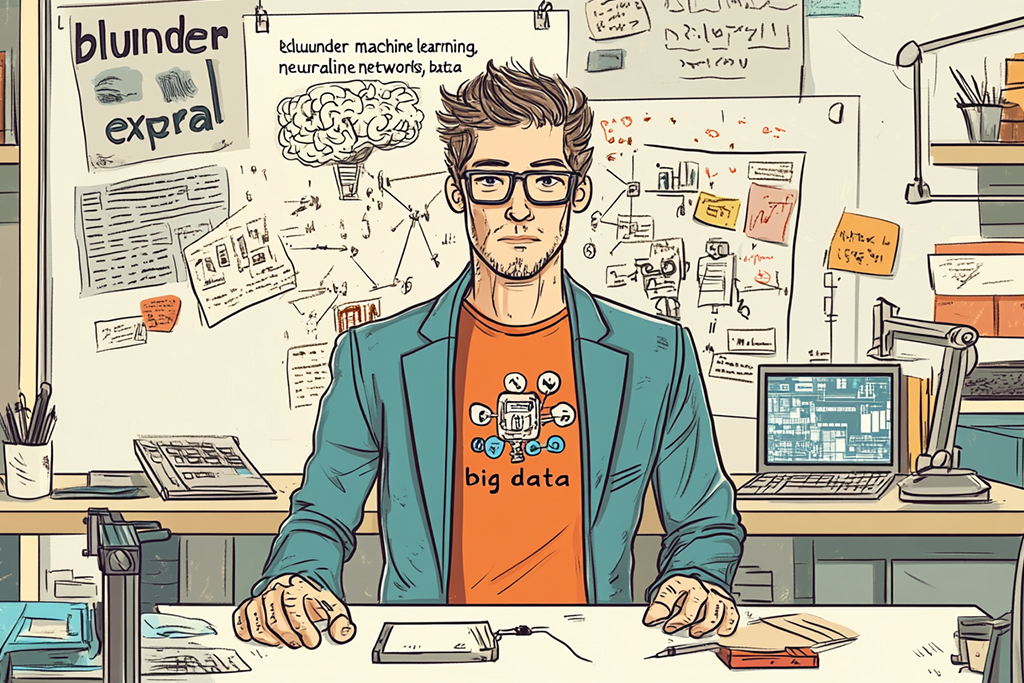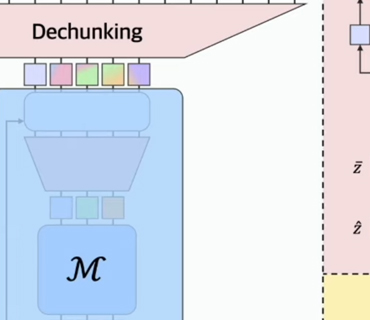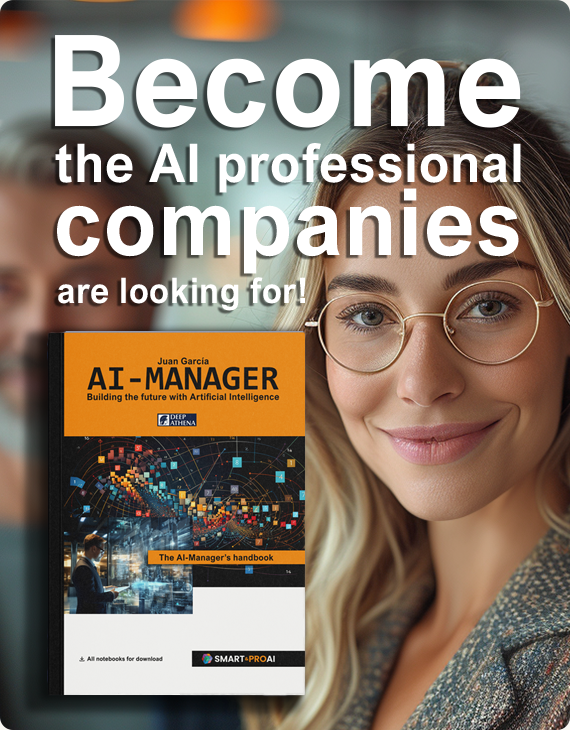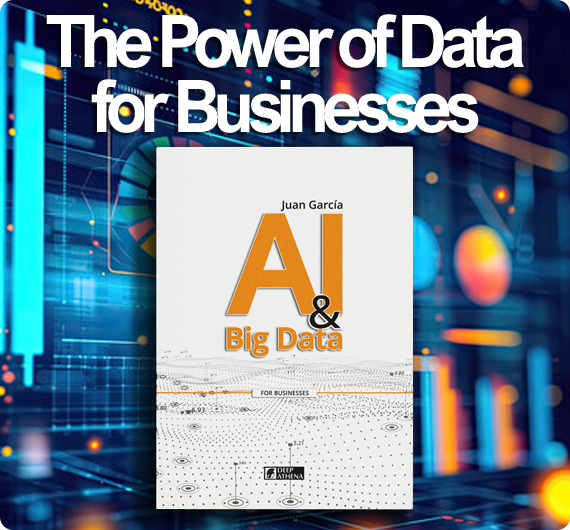Articles

Ctrl + V + AI: The New Experts!
In recent months, especially during 2024, we have witnessed an unprecedented transformation in how artificial intelligence has transitioned from being a technology reserved for specialists and research laboratories to becoming a general interest phenomenon accessible to the mass public. The popularization of artificial intelligence has not only opened up new possibilities in multiple sectors but has also radically changed society's perception of the future of work and interaction with technology.
This expansion of AI has been largely catalyzed by the democratization of technological tools and access to online learning platforms. YouTube, along with other social networks, has played a crucial role in this process, allowing anyone with internet access to learn about artificial intelligence, share their knowledge, and even position themselves as experts in the field. This phenomenon has generated an explosion of AI-related content, from basic tutorials to more advanced analyses. However, this same massive access has led to a new problem: the proliferation of superficial and, in many cases, incorrect information—something that is basically not new, but we never seem to learn from our mistakes.
In this context, numerous individuals have emerged who, taking advantage of the growing demand for AI knowledge, have self-proclaimed themselves as experts or gurus, which I call "quacks" or "storytellers." These figures, often lacking the academic background and practical experience necessary, have found in social networks a means to build an image of authority that does not always correspond to their true level of competence. Through marketing strategies and the exploitation of search trends, these so-called experts manage to capture the attention of an audience that, in most cases, lacks the necessary tools to assess the truthfulness and depth of the information they consume.
The rise of these "storytellers" and "quacks" has led to a saturation of the AI content market. This phenomenon not only affects the quality of information circulating in the public sphere but also has deeper repercussions in the labor market and the general perception of AI. Companies, under the pressure of quickly adapting to new technologies, are tempted to opt for cheaper solutions that are not always backed by solid knowledge. This, in turn, endangers the quality of AI projects and undermines the position of true experts, whose knowledge and experience may be more costly but are crucial for the long-term success of implementing this technology. I must add that here the academies are also very much to blame, a great deal indeed.
The ease with which content can be created and distributed thanks to AI tools has contributed to the massive generation of texts, articles, and publications that, in many cases, are simply copies of others or even produced directly by algorithms with minimal human intervention. This approach, which prioritizes quantity over quality, is eroding trust in the information circulating on the internet and raises serious questions about the ethics and responsibility in disseminating knowledge.
This first look at the current situation leads us to question the dynamics developing around artificial intelligence and its impact on society. While it is true that AI has the potential to positively transform many areas, it is also necessary to be aware of the dangers that arise when knowledge and experience are supplanted by the desire to capitalize on an emerging trend. It is very important to consider the implications both in the short, medium, and long term that this will have on the development of artificial intelligence and the labor market, and therefore professional. I have seen waiters become Data Scientists in just two months with certificates issued by online platforms. With all due respect to waiters, as I started in hospitality, but people, Data Scientist are big words that do not fit you. In just two months... For the love of God!
The popularization of artificial intelligence is a gradual but impactful phenomenon, driven by a confluence of factors that have allowed this technology to integrate into the daily lives of millions of people around the world.
Although it was already here, we are so ignorant that we say it has only been implemented now. Well, let us accept "now" as a point in time. To understand how artificial intelligence has become a general interest topic, it is important to consider both technological advances and the social and economic changes that have accompanied this process.
Firstly, the development of artificial intelligence has been made possible by advances in computer processing power and access to large volumes of data. As computers have become more powerful and affordable, and as the amount of available data has grown exponentially, AI algorithms have been able to be trained with unprecedented efficiency. This increase in the availability of computational resources and data has enabled artificial intelligence to develop more quickly and effectively, which in turn has facilitated its implementation in a variety of applications, from virtual assistants to recommendation systems on streaming platforms.
The adoption of artificial intelligence is being driven by the need for companies to remain competitive in an increasingly globalized and technological market. Automation and process optimization through the use of AI have become key competitive advantages, leading many companies to invest in this technology. However, this growing interest from companies has also generated a massive demand for AI knowledge, creating a fertile market for the emergence of new "experts" in the field. I have been automating and optimizing processes in companies for over 25 years in virtually every department, from production to marketing, sales, and management, and I have never seen anything like what I am seeing in recent months.
Many of these so-called gurus have taken advantage of the viral capacity of social networks to quickly build their reputation, using marketing and promotion techniques that allow them to stand out in a saturated market. Basically, they have positioned themselves using the avalanche of searches.
The most common strategy among these "experts" is the excessive simplification of complex concepts, presenting them in an accessible but often superficial way. Since they themselves do not understand them or know these concepts in-depth. In many cases, this is done through content that is more oriented towards capturing attention than providing a deep understanding of artificial intelligence. This simplification can be useful for introducing people with no experience in the subject, but it also creates a distorted or incomplete understanding of AI, which is detrimental when it comes to applying it in real-world contexts.
On the other hand, the use of artificial intelligence to generate content has exacerbated this problem. Generative AI tools like chatGPT, Gemini, Grok, Claude, etc., allow the creation of articles, posts, and videos with little or no human intervention. This has led to a proliferation of content that not only lacks rigor but is simply wrong or misleading. The ease with which content can be produced and distributed has led to quantity being prioritized over quality, which is especially problematic in a field as complex and nuanced as artificial intelligence.
As artificial intelligence has gained popularity, a narrative has also emerged around its ability to transform the world of work, fueling both exaggerated expectations and unfounded fears. The "experts" who seek to take advantage of this wave of interest have contributed to the creation of myths about AI, often promising unrealistic results or promoting a simplistic view of what AI can and cannot do. This has led to a distorted perception of AI among the general public, which can have serious implications for both business decisions and public policy.
It is important to note that not all new actors in the field of artificial intelligence fall into the category of "storytellers" or "quacks." There are professionals who, although they may not have decades of experience, possess solid training and a genuine commitment to advancing technology and its correct implementation. However, the noise generated by those who seek to capitalize on the moment without a solid foundation of knowledge makes it difficult to distinguish between those who truly add value and those who are merely looking to ride a trend.
This type of content is often characterized by being attractive at first glance, using sensationalist titles or exaggerated promises to capture the reader's or viewer's attention. However, upon delving into the content, it becomes clear that it is designed more to entertain than to inform or educate. The lack of deep analysis, the absence of verifiable data, and the use of generalizations are common in this type of publication. Just reading the text in its first paragraphs is enough to clearly realize that it was written by AI and is basically a copy-paste without even having been read beforehand. It is even obvious that some introduce spelling errors to make it appear that they wrote it themselves, that they know what they are talking about, and that they are human. We are going to enter the "era of forgiveness" where we will finally forgive all spelling mistakes in a book and the errors in the formulas in calculus books, blessed be the AI. Fostering the most human side of humanity.
Well, let me continue, I don't want to get sentimental. The superficiality in content creation is also reflected in the excessive use of automated tools to generate texts, videos, and other types of media. Artificial intelligence has facilitated the mass production of content, which in theory could be positive, but in practice has led to a flood of garbage. Many of the so-called experts in artificial intelligence, taking advantage of the capabilities of these tools, generate large amounts of content in a short period, without taking the necessary time to verify the accuracy of the information or to offer a critical analysis. This "copy-paste" practice, in which ideas are reused and replicated without adding value, is contributing to a kind of information noise, where the true quality and relevance of the content are lost in the midst of an avalanche of superficial publications.
When the content that dominates the public conversation is simplistic or inaccurate, a distorted understanding of what artificial intelligence really is and can do is created. This can lead to the formation of unrealistic expectations or unfounded fears, which in turn can influence how people and companies adopt or reject the technology. Overexposure to superficial content can make the audience develop a cynical or disinterested attitude towards artificial intelligence, with some assuming that it is just another passing fad rather than a tool with real transformative potential.
When the market is saturated with superficial content, it is harder for authentic and well-informed voices to stand out and be heard. Fortunately, this does not happen with the greatest, otherwise what would become of us? Public debates become less informed and more polarized, with extreme positions often based on misunderstandings or simplified interpretations of reality.
Moreover, students and professionals seeking to learn about this field face the challenge of having to navigate through a large amount of information, much of which is neither reliable nor useful, but they do not know it. No one can blame them, but results are what matter. And the truth above all! The abundance of low-quality content can disorient learners and hinder their ability to acquire solid and applicable knowledge, which in most cases is insufficient. And believe me, I know what I'm talking about, in addition to being an "AI guru," I am a business advisor, author of AI books, and a professional trainer with over 25 years of experience. I see this every day in every project I manage. This, in turn, has long-term repercussions on the formation of a truly skilled workforce in artificial intelligence, as quality educational resources get buried under a mass of superficial content. And here I mention again the academies that need to jump on the AI bandwagon; they want to do it as soon as possible and offer courses without even reviewing them. I have developed courses for my own competitors in the market and supervised others that were already being offered. Moreover, have you ever heard the term "Mystery Shopper"? Well, it is a very good strategy for gathering information to conduct market analysis and benchmarking.
And speaking of marketing, superficiality also extends to the marketing and communication strategies used by companies and professionals who wish to position themselves as leaders in artificial intelligence. Aware that attention is a scarce and valuable resource in the digital age, many entities opt to simplify their messages to the point of sacrificing accuracy and detail in favor of virality. While this strategy may be effective in the short term in terms of visibility and engagement, in the long term it contributes to the erosion of public trust in the information they receive. In this case, the public basically has no idea, so they basically swallow whatever they are told. But, as always, when promises are not fulfilled or products do not live up to the expectations created by superficial marketing, the company's reputation suffers, and with it, trust in the technology itself.
The guru not only distorts the public and professional understanding of the technology but also degrades the quality of the debate, discourages the production of high-quality content, and negatively impacts education and the training of professionals. And remember, everything we do also affects our environment.
The impact of artificial intelligence on the labor market is a more complex issue than you can imagine. The introduction of artificial intelligence has triggered significant changes in the employment structure, not only creating new opportunities but also generating challenges and tensions, particularly concerning the growing presence of "experts" who lack true training in this field.
As companies seek to integrate artificial intelligence into their operations, the demand for professionals with specific skills in this field has increased considerably. However, this demand has created a significant gap between the skills available in the market and the needs of companies. The shortage of specialized talent has led some companies to seek alternatives, such as hiring professionals with superficial knowledge or relying heavily on AI solutions that promise to solve complex problems without the need for significant human intervention. This approach can be dangerous, as it can lead to the implementation of low-quality solutions that not only fail to solve the problems for which they were designed but can also cause additional harm to the business. Bearing in mind the development process of each project, where the lack of knowledge, experience, and simply the "expert's" awareness can be catastrophic for companies.
Cost-cutting is a common strategy among companies trying to quickly adapt to new technologies without incurring significant expenses. In this context, many companies opt to hire professionals who present themselves as experts in artificial intelligence but who, in reality, lack the training and experience necessary to face the complex challenges that this technology poses. These so-called experts often offer or accept their services at a lower cost than true specialists, which undoubtedly appeals to companies looking to minimize their expenses. However, this practice has serious consequences for both the quality of the work performed and the reputation of artificial intelligence in the workplace and, of course, for the true experts, who are possibly the most affected in this regard.
When companies rely on professionals who are not adequately trained, the results can be disastrous. Poorly managed artificial intelligence projects not only fail to achieve their objectives but can also generate unexpected results that negatively affect the company. This can include anything from implementing AI systems that do not fit the specific needs of the business to creating algorithms that perpetuate biases or fail to meet necessary ethical standards. Ultimately, this mismanagement not only affects the individual company but also contributes to a negative perception of artificial intelligence in the labor market in general. This is one of the main problems I have to face not only as an expert and advisor but also as a professional trainer. You cannot tell me that you are an expert in Big Data if you have only taken a one-week course and the course itself is rubbish. It is okay to try to ride the wave, it is okay to want to open up a new professional path, it is okay to want recognition and admiration, but the truth must come first—you are not an expert just because you have taken several courses in two months. It takes a lot of deep knowledge and experience. Finding the right balance is not easy, but don't mess with me and don't tell me you are an expert if two months ago you didn't even know what AI was.
Well, let me continue. On the other hand, the growing presence of superficial content and the proliferation of so-called experts in artificial intelligence have also created considerable confusion among employers. Companies that do not have a deep knowledge of artificial intelligence are often overwhelmed by the amount of contradictory or erroneous information circulating on the internet, and this is also a topic of which they are completely unaware. This can lead to poorly informed decisions in hiring personnel and implementing AI technologies, with the risk that companies end up investing in projects that do not provide real value or are unsustainable in the long term due to poor advice from their "expert."
In addition, the pressure to remain competitive in an environment where artificial intelligence is increasingly valued has led some companies to underestimate the importance of solid and continuous training in this field. Of course, the problem is that the need, rather than the demand, is enormous compared to the pool of experts and professionals in the field. Instead of investing in training their staff or hiring experts with a proven track record, they opt for quick solutions that promise immediate results but are often unsustainable. Here, temp agencies and the like come into play. I can assure you that this approach not only affects the quality of the work performed by the expert but also endangers the long-term stability of the company, as inadequate implementation of artificial intelligence can have negative consequences that are difficult to reverse. The costs of an AI project can be enormous, so the losses, considering everything involved in an AI project, are colossal.
The impact on the labor market also extends to the perception and value placed on traditional skills compared to new competencies in artificial intelligence. As AI integrates into more areas of work, there is a reevaluation of the skills needed to thrive in a rapidly changing work environment. Technical skills, such as programming and data management, are gaining increasing value, while more traditional skills may be seen as less relevant. Here comes the company's "geek." However, this trend also underscores the importance of complementary skills such as critical thinking, creativity, and ethics, which are essential for responsible and effective implementation of artificial intelligence, where the importance of good training comes into play—and by this, I mean not just abundance but the true quality of the courses offered by the academies. I can assure you, because I have done and continue to do, that most are deplorable and a rip-off for the student. Humans take advantage of the naivety of humans. Academies take advantage of people's ignorance.
Companies must be aware of the risks associated with relying on so-called experts and implementing superficial solutions.
The transformation that artificial intelligence is bringing to the labor market is profound and, in many cases, inevitable. However, how this transition is managed will determine whether the outcomes are positive or negative. The key to successfully navigating this new environment lies in recognizing the complexity of artificial intelligence and investing in the training and hiring of skilled professionals.
The vicious cycle of misinformation is a phenomenon that has taken on alarming relevance over at least the last 20 years, particularly in recent months in the context of artificial intelligence. This cycle of misinformation feeds and perpetuates itself, creating a situation where the quality of available information gradually decreases while the amount of erroneous or superficial content increases. My eyes hurt from what I see on LinkedIn every day, and my stomach turns when I think about what is happening.
As this superficial content spreads, it begins to influence the public perception of artificial intelligence. People who consume this type of information start to develop mistaken ideas about what AI can do, its impact on employment, and the ethical challenges it poses. These erroneous perceptions not only affect public opinion but can also influence business and policy decisions. Business leaders, for example, may base their decisions on inaccurate information, leading to the implementation of AI technologies that are not suitable for the company's needs or that are not aligned with long-term goals. Similarly, public policymakers may be pressured to legislate around artificial intelligence based on a distorted understanding of the technology, which can result in ineffective or counterproductive regulations.
The cycle perpetuates itself when those who have been influenced by this misinformation begin to share their incorrect understanding of artificial intelligence with others, whether through social networks, informal conversations, or even in professional and academic settings. As more people share and amplify this erroneous information, a feedback effect is created that reinforces and expands the reach of misinformation. This phenomenon is especially problematic in a digital environment where communication platforms are designed to maximize engagement, rewarding the quantity of interactions over the quality of information. As a result, superficial and sensational content tends to receive more attention than careful, evidence-based analysis, further perpetuating the cycle of misinformation.
Another factor contributing to the vicious cycle of misinformation is the lack of incentives for the creation of high-quality, well-founded content. In a market saturated with information, content creators face pressure to produce material quickly to maintain relevance and attract an audience that quickly moves from one topic to another. This pressure can lead to prioritizing speed over accuracy and adopting practices such as copy-paste or excessive simplification of complex topics. In turn, content consumers, overwhelmed by an avalanche of information, may have difficulty distinguishing between what is reliable and what is not, further reinforcing the dissemination of superficial material.
The intervention of recommendation algorithms on platforms like YouTube, Twitter, and Facebook also plays a crucial role in perpetuating this cycle. These algorithms are designed to maximize the time users spend on the platform, and they do so by recommending content likely to generate interactions, regardless of its quality or accuracy. As a result, superficial and sensational content is frequently promoted over more rigorous and analytical content. This not only amplifies misinformation but also makes it difficult for the public to access accurate and quality information, even if they actively seek it. Basically, they fill the internet with garbage, burying valuable, truthful information and valuable channels where one can truly learn and those that contribute to a genuinely interested individual becoming an expert by increasing their understanding of complex topics.
The impact of this vicious cycle of misinformation is profound and far-reaching. We have lived through it many times, but again, we do not learn from our mistakes! It not only contributes to the proliferation of myths and misunderstandings about artificial intelligence but also weakens public trust in the technology and those who develop and implement it. As more people are exposed to erroneous and superficial information, the gap between the perception and reality of artificial intelligence widens, which can lead to widespread skepticism or, conversely, uncritical adoption of technologies that have not been adequately understood or evaluated.
This cycle of misinformation has implications for education and training in artificial intelligence. Students and professionals seeking to learn about AI may find it difficult to access quality educational resources in an environment dominated by superficial content.
It is very important to consider the role played by well-intentioned but poorly informed actors in this cycle of misinformation. In some cases, well-meaning people may share information they consider valuable, without realizing that it is incomplete or incorrect. Maybe they just want to share news, appear active in the field, show their knowledge on the subject, and they seek nothing more than to position themselves and take advantage of the wave, but that is the problem—that many, without intending to deceive anyone, do not even read the post that chatGPT wrote for them. Copy-Paste! And it is this type of action, though not malicious, that contributes to perpetuating the cycle of misinformation, especially when it comes from individuals who have some authority or influence in their communities. This underscores the importance of media literacy and the need to develop critical thinking at all levels of society to break this cycle and foster a healthier and more accurate information environment.
Recognizing true experts in artificial intelligence is a challenging task in an environment where the proliferation of "storytellers" and "quacks" has saturated the market for AI-related information and services. Identifying genuine professionals, those who truly possess the knowledge and experience necessary to add value in this field, requires a combination of attention to credentials, analysis of professional history, and evaluation of the quality and originality of the work they present. In this regard, it is important to emphasize that there is no single indicator that alone guarantees the authenticity of an expert; rather, it is the convergence of multiple factors that allows this distinction to be made. Here it is even sad how most recruitment companies are working. There are many more professionals than they admit, and a great deal of potential as well, along with motivation to learn; what happens is that most recruitment companies are not qualified, no matter how many "awards" they have hanging on their walls, to capture qualified personnel.
One of the first aspects to consider when evaluating a supposed expert in artificial intelligence is their academic and technical training. AI is a highly specialized field that requires deep knowledge in areas such as mathematics, statistics, data science, and programming, in addition to an understanding of the fundamental principles of computer science and machine learning. Personally, it doesn't matter to me if you have a certificate if you don't understand what you have studied. On the other hand, if you have developed an AI project all by yourself with everything that entails and don't have a single certificate but do have the motivation to acquire them, then you, the one who developed the project, have more value than someone who just has the certificate; and I say "just." True experts usually have advanced degrees in related disciplines, such as computer science, engineering, mathematics, or physics. These fields go much further, and I speak from experience—you don't need to be a mathematician to be an AI expert. Furthermore, it is common for them to have completed significant research during their postgraduate studies, reflected in publications in peer-reviewed scientific journals. Here, an expert doesn't even read them, and a guru just does copy-paste and repeats. These publications, articles, and papers, among others, are an important indicator of the expert's ability to contribute to advancing knowledge in the field of AI, as they demonstrate their ability to develop new ideas and subject them to scrutiny by the academic community.
In addition to academic training, it is essential to evaluate the expert's practical experience in implementing artificial intelligence projects. And here I speak as the AI manager that I am. True experts have worked on complex projects that go beyond theory and have applied their knowledge to solve real-world problems in the industry. This can include the development of machine learning models, the implementation of AI systems in companies, or applied research in innovation labs. The ability to handle technical and ethical challenges in applying AI is a key indicator of practical experience. Often, these professionals have worked in collaboration with multidisciplinary teams, which is also a sign of their ability to integrate artificial intelligence into diverse and complex contexts. For example, I know other AI managers who can't even read code. Ask yourself then if that person is truly capable of understanding your needs, managing the project, and supporting the team when necessary, including understanding the tasks of the project team members. It is very sad to see what these "experts" are going to cause.
Active participation in the artificial intelligence community is another factor that distinguishes true experts. Authentic professionals are often members of scientific and technical associations, such as the Association for the Advancement of Artificial Intelligence (AAAI) or the Institute of Electrical and Electronics Engineers (IEEE), to name an example. To become a GM in chess, you must be federated and compete to demonstrate your ELO. Their participation in international conferences, workshops, and seminars is a sign of their ongoing commitment to updating their knowledge and disseminating their findings. For this, the candidate doesn't need to be the CEO of Google DeepMind, but true experts are often cited by other professionals in the field, reinforcing their reputation as authorities on the subject. Logically, not all professionals would be at this level, but if you observe these principles, you will find them and know how to differentiate them. Presence at conferences and the frequency with which they are invited to speak at major events are also relevant indicators and, of course, worth recommending, as they indicate that the "expert" is indeed an expert, not a guru.
A publication history and contributions to knowledge are also essential elements in identifying a true expert. AI professionals who truly add value tend to have published numerous or several articles, studies, and books that are widely recognized in the community. These publications not only address cutting-edge topics but also often include critical analyses, discussions on the ethical and social implications of AI, and innovative proposals that have influenced the field's development. Unlike "storytellers," who tend to recycle existing ideas without offering new perspectives, true experts generate original content that contributes to the progress of knowledge.
Another aspect to consider is the supposed expert's ability to explain complex concepts clearly and precisely. A true expert not only masters their field but also has the pedagogical skill to communicate their knowledge to different audiences, from technical to the general public. This ability is reflected in how they approach teaching and mentoring, whether through courses, workshops, or educational material. Authentic experts understand the importance of education and continuous training in a dynamic field like artificial intelligence and dedicate themselves to training the next generation of professionals. It is common for these experts to participate as professors at prestigious universities or collaborate in creating high-level educational programs.
Ethics and transparency in professional practice are also distinguishing characteristics of true experts in artificial intelligence. In a field that poses so many ethical challenges, from bias in algorithms to data privacy, it is essential that experts are aware of these issues and approach their work with a strong sense of responsibility. Authentic professionals are transparent about the limitations and risks of artificial intelligence and do not make exaggerated promises about what the technology can achieve. AI can't do everything, not today, and possibly won't be able to for a long time. Instead of selling quick and easy solutions, they focus on offering thoughtful analysis and advice based on reality, even if it means acknowledging the challenges and difficulties that may be encountered in implementing AI.
Reputation in the sector is another key indicator for identifying a true expert. True AI professionals tend to have a proven track record of success in their projects and are respected by their peers. Client and colleague references, as well as testimonials from previous projects, can provide valuable insight into the expert's work quality and ability to meet expectations.
It is important to evaluate the supposed expert's independence and objectivity. True AI experts are not easily influenced by passing trends or short-term commercial interests. This is very, very important—they maintain a critical, evidence-based stance and are willing to question popular narratives if they do not align with data and reality. This independence is reflected in their willingness to address controversial topics and in their ability to offer analyses that do not always align with the mainstream but are well-founded and supported by their experience and knowledge.
It is possible to distinguish between those who truly master the field of artificial intelligence and those who are merely looking to take advantage of the growing interest in this topic without adding real value!
The future of the labor market and information in the era of artificial intelligence is shaping up to be a scenario of profound changes, challenges, and opportunities. Artificial intelligence, which is already transforming numerous industries, will continue to exert an increasing influence on the configuration of required skills, the nature of work, and how information is created, distributed, and consumed. This transformation process is neither linear nor entirely predictable, as it involves a series of interconnected factors, including technological advances, changes in labor policies, cultural adaptations, and evolutions in education and training.
In terms of the labor market, artificial intelligence is driving a reconfiguration of roles and skills required in virtually every sector. As AI technologies continue to develop, we will see an increase in the demand for specialized technical skills, such as programming in specific AI languages, handling large volumes of data, and the ability to develop and fine-tune machine learning models; as of today, but something that may change in the future (in a few months) with the issue of programming. However, not only technical skills will be necessary; the ability to interpret AI results, make ethical and strategic decisions based on those results, and effectively communicate the implications of the technology will become equally important competencies. From my point of view, one of the most important skills any team member in the project should have is data analysis and understanding. In this respect, I consider myself privileged, but unfortunately, there is little interest on the part of many, even on the part of project managers. Pathetic!
As more tasks become automated, the nature of human work will also change. Repetitive, rule-based tasks that previously required human intervention will increasingly be performed by machines, freeing workers to focus on activities that require creativity, critical thinking, and complex decision-making. Basically what we've been talking about every day for over a year now. However, this transition will not be easy for all workers. Those who fail or refuse or neither succeed nor want to adapt to the new market demands will find themselves in a very vulnerable position, facing significant challenges in terms of employability. In other words, they will be fired and replaced either by someone who knows AI or by AI itself. Therefore, continuous training and career retraining will be crucial for workers to remain relevant in a constantly evolving market. Like it or not, we have no other choice; so if you are very comfortable with your job and life, I am sorry to say that you need to wake up, move your butt, and start learning. It doesn't matter if you're 24 and just finished college, 30 and have a permanent job, or 50 years old. You need to start learning and discover how you can apply it to your work and get the most out of it.
The impact of artificial intelligence on the labor market also raises significant questions about equity and wealth distribution. While automation and AI can increase efficiency and reduce costs, they also risk widening economic gaps between those who have access to education and opportunities in advanced technology and those who do not. This disparity will lead to a massive increase in income inequality unless measures are taken to ensure that the benefits of artificial intelligence are more equitably distributed throughout society. This could include public policies that promote accessible education in emerging technologies, qualitative (and I say "qualitative," not "cheap") state-funded retraining programs, and the creation of social safety nets that protect workers displaced by automation.
The future of information in the AI era will also depend on how the ethical challenges associated with using AI to create and distribute content are managed. This is a more complex issue than simply talking about biases in AI.
The ability to understand and use AI tools will become a transversal competency that will be indispensable in many fields.
The future of the labor market and information in the AI era will be marked by the need for adaptation and resilience. Both workers and companies must be prepared for an ever-changing environment where the ability to learn and adapt quickly is more valuable than ever. Education and continuous training play a central role in this process, as does the ability of institutions to foster an environment that promotes innovation, equity, and responsibility in the use of artificial intelligence. This transformation process, although challenging, also offers the opportunity to create a more inclusive, efficient, and ethical labor and information future. Something that, personally, I do not believe will happen. If we haven't done it already today, we can forget about it. Here, artificial intelligence has almost nothing to do with it; it depends on human beings, on society; like many other issues.
The popularization of artificial intelligence has unleashed a wave of opportunities, but it has also created an environment where the line between true knowledge and the appearance of knowledge has become dangerously blurred. The ease with which information can be accessed and shared, combined with the power of digital platforms to amplify certain voices, has allowed individuals without adequate training to position themselves as authorities on the subject. This phenomenon, which might initially seem like a minor side effect, has profound repercussions, both for the quality of the information circulating and for the decisions made at the business and social levels based on that information.
The impact on the labor market is particularly notable. The demand for AI professionals has grown exponentially, but this demand has also created a gap between true experts and those who present themselves as such without having the necessary experience or knowledge. Companies that opt for cheaper, less qualified solutions often find out, too late, that the results do not meet expectations, which can have costly and lasting consequences; and this is basically what will happen in the coming months when the true results are seen in the industry, especially in medium-sized companies.
That is why it is stated with certainty that it is not artificial intelligence that causes harm, but rather we are responsible for the consequences of its use.














The Author
Juan García
Juan García is an Artificial Intelligence Expert, Author, and Educator with over 25 years of professional experience in Industrual Businesses. He advises companies across Europe on AI Strategy and Project Implementation and is the Founder of DEEP ATHENA and SMART &PRO AI. Certified by IBM as an Advanced Machine Learning Specialist, AI Manager and Professional Trainer, Juan has written several acclaimed Books on AI, Machine Learning, Big Data, and Data Strategy. His Work focuses on making complex AI Topics accessible and practical for Professionals, Leaders, and Students alike.
More